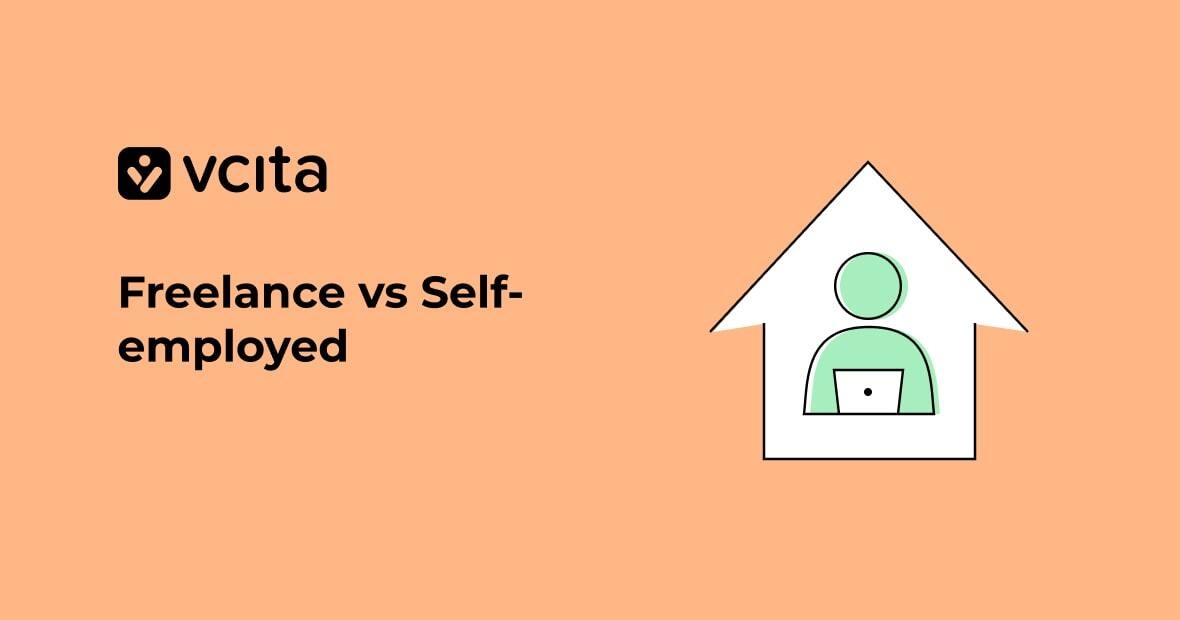You’ve been thinking of taking the plunge into self-employment, but you’re wondering if you should go freelance or be self employed. Although both of these options are a big step away from working as an employed person in a salaried position, there are important differences between being a freelancer versus a business owner.
Making the right choice can have an important impact on how your career unfolds. This article breaks down the distinctions between these two common types of work for employed professionals, so you can seek a new source of income on your own terms.
Defining freelance and self-employed
It’s important to understand the distinction between being a freelancer and being self-employed. It begins in the definition of the two types of work.
Freelance work
As a freelancer, you’re an independent contractor, not an employee or a business owner. You take on temporary jobs and work on multiple projects for different clients, but you can’t hire your own employees. Freelancers typically charge by the hour or project and work on a flexible schedule. Many freelancers work full time, but some freelance on the side for extra income.
Running a business
As a self-employed business owner, you provide an ongoing service or sell a product. You have complete control and flexibility over your work hours and type of work. Self-employed individuals can hire employees to help run their business. They pay self-employment taxes and have the responsibilities of business owners like managing finances, marketing, and growth.
The key differences between freelance and self-employed
Freelancers and self-employed individuals share many similarities. They both have complete control over their work, and don’t receive any employee benefits. It stands in contrast to an employed person, who works for a single employer and has regular work hours, typically receiving employee benefits.
But there are still important differences between being freelance and self-employed.
- Freedom
Freelancers take on multiple projects for different clients. They can set their own work hours and choose the type of work they want to do. Freelance jobs typically have a shorter-term focus. Self-employed people have more responsibility in running their business and marketing their product or service, and more commitment to the long-term success of their company.
- Taxes and expenses
Employed professionals only pay income taxes. Freelancers and self-employed people, however, pay self-employment taxes and are responsible for their own business expenses. Sole proprietors can deduct business expenses to lower their tax burden.For self-employed expats managing their own tax obligations, it is crucial to leverage online tools such as Expatfile, especially if handling unique financial situations globally. These advanced services ensure accuracy and compliance, helping you focus on growing your business while meeting all tax liabilities from overseas operations.
- Job Security
Employed individuals usually have more job security, stable income, and benefits. Freelance work, on the other hand, tends to be insecure, with income depending on finding new clients and projects. Self-employed people can also feel unstable, but they can build security over time as their business grows.
The pros and cons of being freelance vs. self-employed
Both freelancing and self-employment can be very rewarding, so take your time exploring all the options before deciding which path is right for you. Here is a summary of the pros and cons of each approach.
The pros of freelance work
- Plenty of variety taking on multiple jobs or projects for different clients.
- Gain experience in different areas
- Complete control over the type of work you do and your work hours.
- No responsibility for employees.
The cons of freelance work
- Freelance work may not provide a steady source of income.
- You’re always looking for the next project and client.
- You have to handle your own employment taxes and benefits as an independent contractor.
The pros of being self-employed
- You can make a higher income
- You can build your business to be profitable, stable, and highly successful.
- You can hire employees to expand your business.
- You can create a company that lasts for the long term.
The cons of being self-employed
- You bear all the risks if the business doesn’t succeed.
- It often requires working long hours to get your business off the ground.
- You have to handle all business expenses and taxes.
Questions to help you decide if freelance or self-employed is right for you
Do you want to commit to one type of work or have flexibility?
As a freelancer, you typically take on multiple projects and jobs at once, allowing you to do different types of work. Self-employed people usually focus on providing a single product or service. If you want flexibility and variety in your work, freelancing may suit you better. If you prefer stability, being self-employed is probably a good option.
How much control do you want over your work?
Freelancers have almost complete control over which jobs they take on and what hours they work. Self-employed individuals also have a lot of control, but they need to make sure their business is set up for long-term success. If you value independence and flexibility, freelancing gives you more control. If you want to build something that can eventually run itself, being self-employed may be more fulfilling.
Are you ready to handle the responsibilities of running a business?
As a self-employed person, you take on all the responsibilities of running a business, like hiring employees, paying employment taxes, and providing your own benefits. Freelancers act as independent contractors, so they don’t have to worry about these additional business responsibilities. If you want to avoid the hassles of running a company and just focus on the work, freelancing is probably a good choice. If you’re ready to build a sustainable business, self-employment may be the way to go.
Next steps: registering as a freelancer or self-employed
Once you’ve decided between freelancing or becoming self-employed, it’s time to make it official.
Self-employed individuals register as sole proprietors.
Independent contractor (freelancer)
As a freelancer, you’ll need to register as an independent contractor and possibly file for business permits or licenses, depending on your type of work. Remember that you are responsible for your personal tax return and your own social security and Medicare payments. You should also consider health insurance options, as you won’t receive employee benefits.
Sole proprietor (self-employed)
People who want to be self-employed need to register with the local Chamber of Commerce as a sole proprietor of a business, and get an EIN from the IRS so you can employ workers. You might also need to register for specific business permits or licenses, depending on your field of business. You’re responsible for employment taxes, business taxes, social security and Medicare, and benefits for you and your employees.
Choosing the right business structure frees you to earn a positive income
Deciding between freelancing and self-employment comes down to your skills, priorities, and the type of work you want to do. Freelancing provides more flexibility while being self-employed gives you the opportunity to build something long term. Do your research to determine what’s right for your situation. With some work on the front end, you can establish a successful freelance business or self-employed venture as your main source of income.





